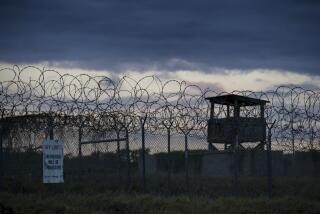Pakistan arrests senior Taliban aide
- Share via
ISLAMABAD, PAKISTAN — In an unusual instance of cross-border cooperation, Pakistani authorities arrested a ranking figure in Afghanistan’s Taliban movement after receiving a tip that he had entered Pakistan, officials disclosed Saturday.
Few details were provided about the capture of Ustad Yasar, a senior aide to Taliban supreme leader Mullah Mohammed Omar. He had been released by Afghan officials in 2007 in a much-criticized prisoner exchange to secure the freedom of a kidnapped Italian journalist.
Pakistani officials said Yasar was picked up in the frontier city of Peshawar, the hub of the nation’s volatile northwest and a growing center of the Islamist insurgency on the Pakistan side of the border. They did not say when the arrest occurred.
Western military officials say senior Taliban commanders as well as lower-level fighters move freely back and forth across the rugged, poorly marked Pakistan-Afghanistan frontier. But only rarely do Pakistani officials move to seize such figures.
Yasar’s arrest was disclosed one day after a meeting in Kabul, the Afghan capital, at which senior Afghan, Pakistani and Western officials discussed ways to better coordinate efforts to fight Islamic insurgents. The capture provided a glimpse of the intertwined command structures of the Taliban movements in Afghanistan and Pakistan.
According to Pakistani news reports, Omar sent Yasar, his sometime spokesman, to Pakistan to try to mediate a dispute among Pakistani Taliban factions. These Taliban fighters have their own leaders and their own agenda of carrying out attacks against Pakistani troops, government installations and other targets. But they are also known to coordinate with Afghan counterparts.
Yasar was first captured in 2005 in Pakistan, where he had fled into the largely lawless rural border region with many other Afghan Taliban fighters. Turned over to Kabul authorities, Yasar was jailed in Afghanistan until March 2007, when he was freed in exchange for journalist Daniele Mastrogiacomo -- a case that turned out to be a precursor to a string of similar kidnappings.
Mastrogiacomo, a veteran correspondent for the Italian daily La Repubblica, was seized along with his driver and an Afghan colleague in southern Afghanistan. His captors beheaded the driver in front of him, documenting the execution in a grisly video. After Mastrogiacomo made a videotaped plea for his own life, Afghan authorities freed Yasar and four other senior Taliban militants, as demanded by the kidnappers.
Mastrogiacomo was released unharmed, but the Afghan journalist, Ajmal Naqshbandi, was later found dead.
Aid agencies, foreign security officials and others warned at the time that the Afghan government’s willingness to strike a deal with the kidnappers probably would spur similar abductions. These fears proved well-founded; the latter part of the year saw an upsurge in such incidents.
Last week, U.S. Ambassador William Wood told journalists in Afghanistan that there were about twice as many abductions in 2008 as in 2007, mostly involving Afghan nationals, but also a number of foreign aid workers and journalists.
Some of the kidnappings have been criminal cases involving large ransom demands, but others have apparently been politically motivated.
The Mastrogiacomo case clearly struck a chord with Western and Afghan officials. Of the five militants freed in the swap, three were eventually tracked down and killed by coalition troops. Yasar, meanwhile, was thought to have been under surveillance for some time.
--
Special correspondent Zulfiqar Ali in Peshawar contributed to this report.
More to Read
Sign up for Essential California
The most important California stories and recommendations in your inbox every morning.
You may occasionally receive promotional content from the Los Angeles Times.










